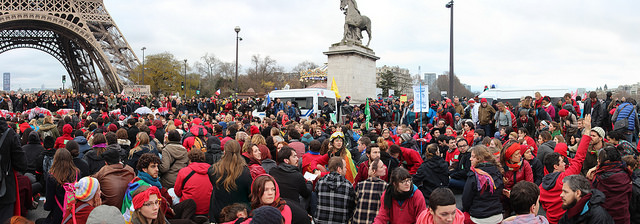In 2011, I wrote about how little that year’s climate conference had accomplished. The latest edition of the Conference of the Parties to the United Nations Framework Convention on Climate Change just wrapped up in Paris over the weekend with a historic agreement.
Nearly 200 nations acknowledged the importance of keeping global temperatures from rising more than 2 degrees Celsius above pre-industrial levels during this century. They even nodded to the benefits of keeping temperatures from rising more than 1.5 degrees. But nod is about all they did. As I wrote yesterday at FiveThirtyEight, the new agreement contains no binding targets and is essentially just an aspirational document. When it comes to climate change, we need strong aspirations, but we also need concrete actions to back them up, and this new agreement provides only empty words until the member states decide to take real action.
If this were, say, 1995, the year of the first COP talks, the aspirations and infrastructure laid out in the Paris Agreement would be an encouraging step in the right direction. But the Paris Agreement takes baby steps in a time that requires drastic measures. It recognizes what must be done without ensuring that these steps are taken, and it omits two major, global sources of emissions: shipping and aviation. The pledges submitted by participating countries cannot reach the stated goals, and plans to meet the 2 degree target rely on technologies that don’t yet exist. The agreement acknowledges the need to compensate the most vulnerable countries for “loss and damage” — the devastation they face from climate disruptions caused by richer nations who’ve built wealth at their expense — but there are no binding requirements to do so.
It’s now been more than 20 years since the world began gathering yearly to discuss what to do about climate change, and we’ve made so little progress and members of COP have shown so little will to take the hard steps necessary to address the problem at hand that my 2011 proposal — let’s stop pretending we give a damn about climate change — feels as relevant as ever. Yesterday, my esteemed LWON colleague Michelle Nijhuis argued that, “The Paris agreement is a huge step toward easing the suffering of future generations,” but I can’t share her enthusiasm. Despite all the cheers coming out of Paris, I’m not convinced we can place hope in the current political process. The following text is from my 2011 post.
 Maybe it’s time to stop pretending that we can find an agreeable solution to this global problem. We’ve known about climate change for decades now, and we’ve failed miserably in our attempts to do anything about it. Last year, global carbon emissions grew at the highest rate ever recorded, even in the wake of a recession.
Maybe it’s time to stop pretending that we can find an agreeable solution to this global problem. We’ve known about climate change for decades now, and we’ve failed miserably in our attempts to do anything about it. Last year, global carbon emissions grew at the highest rate ever recorded, even in the wake of a recession.
In 2010, U.S. carbon emissions climbed more than four percent, totaling 1.5 billion tons, while China spewed 2.2 billion tons into the atmosphere — a more than 10 percent increase. This trend shows no immediate signs of slowing. We are on a collision course, and science won’t help us. Science has provided the data. It’s up to us to interpret those data and decide what course of action to take in light of them, and that’s where things fall apart.
Our minds filter information through our pre-existing belief systems, and in light of this, denial is a perfectly predictable response to climate change. It’s simple human nature to reject facts that conflict with our self identities. Most of us consider ourselves rational, compassionate beings and the idea that our way of life could be harming the planet or threatening to push poor people out of their homes presents a stark contrast to our self-images as good people.
And so, we pretend that it’s not our fault. We disassociate our actions with their far-off consequences. Some people pretend that climate change is just a big hoax, created to swindle money from suckers. Others pretend that they can make a difference by purchasing better stuff. (Don’t worry about driving less, just buy a hybrid car!) Some fall prey to single action bias, taking small steps to reduce their carbon emissions and then concluding, like the self-proclaimed environmentalists in one study, that one good deed, like recycling, entitles them to indulge in a much bigger bad one, such as flying.
A 2009 Reuters poll found that people say they want to “save the planet,” unless it requires significant lifestyle changes like eating less meat or giving up air travel.
Most of us (myself included) draw the line at personal convenience, but the ugly truth is that we won’t fix the climate problem without fundamental changes to how we live. In a world with seven billion people, there will be winners and losers, but we can’t continue to consume energy at our current rates.
A hard look at the numbers shows that there’s simply no way we continue on the energy- intensive path that we’re on. “We’re going to have to plan for a future where we use less energy,” Richard Heinberg told me at the Aspen Environment Forum a couple of years ago. Some groups, like Heinberg’s Post Carbon Institute and 350.org are already working toward this reality.
The problem can seem insurmountable, and it’s possible that it is — not because there is no solution, but because we are incapable of choosing it. There’s a one-word solution to the climate (and energy) problem staring us in the face —restraint. Simply consuming less. It’s too late to talk about carbon emissions. With a population catapulting toward nine billion or more, it’s time to focus on carbon omissions.
Restraint is not the easy, no-need-to-change-a-thing solution that people keep pretending we will find. But it’s a reality-based solution that will happen whether we want it to or not. We can plan for it and make the hard choices ourselves, or we can wait for them to be forced upon us. Using less doesn’t necessarily mean lowering our quality of life, it means redefining how we measure our wellbeing. As I learned first-hand when I gave up travel, some of the things we consider essential simply aren’t.
We are so far into this problem now that making any significant difference will require change on the grandest scale. We’re all in this together. We need collective action. And yet individual actions still matter. When you absolve your personal contribution and put the responsibility for change on government and society, the issue becomes an abstract problem that’s impossible to solve. Yes, we need change on a societal level. We need to pressure decision-makers to take bold action. But if each one of us would also take back our little part of the problem, there would be no parts left.
Our leaders have failed. It’s up to us. We can pretend to care about climate change, or we can buckle down and actually do something about it.
***
Photos: Oxfam International and Paris rally by Takver via Flickr.

Shipping and aviation? How about the global war machine and its anti-life agenda, or the unrelenting geo-engineering programs (and militarized weather control)? More that just shipping and aviation going on there.
I’m sorry, but you use the word “pretend” too much. “Some people pretend that climate change is just a big hoax,” – These people are not pretending at all. they are totally committed to using SCIENCE, not dumbed down government propaganda like the type you have already swallowed. Please educate yourself about simple chemistry.